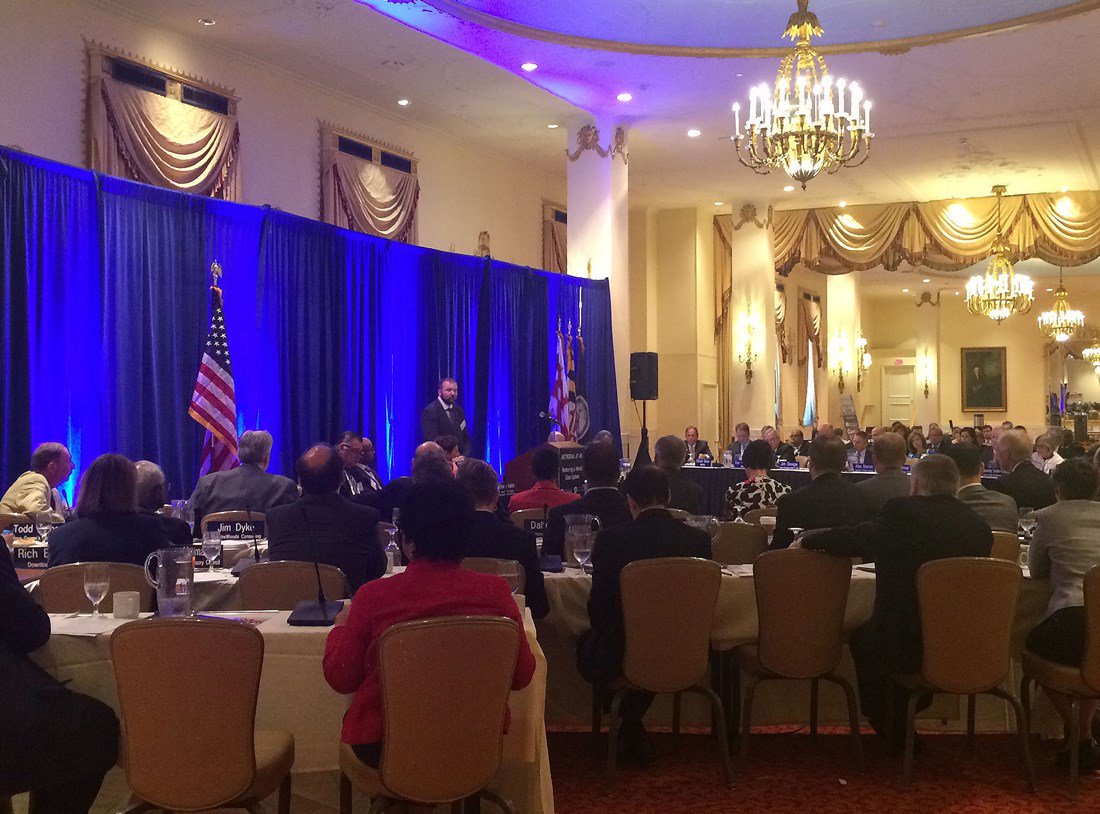
Area business, civic, and government leaders gather June 13 for the "Metrorail at 40: Lessons from Major North American Transit Systems" forum. (MWCOG)
The heads of five major North American transit agencies were on hand at a June 13 forum of area business, civic, and government leaders to discuss the future of the region’s Metro system. The half-day event, “Metrorail at 40: Lessons from Major North American Transit Systems,” was organized by the Metropolitan Washington Council of Governments and the Greater Washington Board of Trade. The five transit chiefs, from Chicago, New York, Toronto, Atlanta, and Miami-Dade, talked about the challenges they face in maintaining safe and reliable systems and paying for much-needed improvements. Here are some of the key takeaways from the presentations and discussion:
- Metro’s challenges are not unique. All five transit chiefs said they are facing very similar maintenance needs, disruptive track work, and funding challenges. Chicago’s transit chief said that single-tracking and shutdowns are now part of normal day-to-day business for CTA.
- What is unique for Metro, though, is that the agency does not have a stable, predictable source of funding. The heads of all five agencies said that stable, predictable funding was an essential part of how they plan and pay for improvements. For many, that means some kind of sales tax. But, they said, funding provides predictability and makes it easier to plan and carry out improvements; it is not a silver bullet to meet all funding needs.
- Two things are needed to turn systems like Metro around: time and money. Several transit chiefs kept reiterating this point. They said that digging out of the hole of deferred maintenance takes a long time. It simply can’t happen overnight. But with patience and perseverance, they assured attendees that it can happen.
- Before you ask for money you must restore credibility with skeptics. That means doing simple things well, achieving small wins early, and demonstrating to riders that you care and are able to deliver.
- You also have to develop a clear plan for how you will spend the money and communicate your progress in achieving outcomes. That means clearly identifying maintenance needs and how much they will cost, establishing performance metrics and desired targets and outcomes, and providing clear and frequent updates on progress in achieving those outcomes.
- And to achieve anything at the state level, you have to make the “economic development” case to legislators outside the region. Gaining state support and funding for transit means convincing people who don’t use the system to help pay for it. One of the transit chiefs said that they have worked hard to brand “transit” as a “state issue”—by articulating its economic development value for urban areas as well as reminding rural lawmakers that transit is a vital part of the transportation system in smaller communities, too.
- Even when everything goes right, it still takes a lot of work and will never really be “done.”
In addition to the transit agency panelists, the forum also featured a presentation by transit expert Alex Barron, of the Imperial College London. He outlined several attributes of successful world class transit systems, including:
- Use of robust performance measurement to track and achieve results
- High rates of reinvestment in existing infrastructure
- Doing simple things well, like keeping stations clean and bright, or taking advantage of new technologies to improve the customer experience
- Providing high levels of frequency and capacity.
- Adapting easily to changing needs and technologies to constantly improve
Barron offered some good news. He said that Metro has a number of strengths that it can capitalize on, including a sustainable fare policy, a system built for future capacity increases, and international models of transit-oriented development. In the weeks ahead, COG will be setting up a technical panel to develop financial and operating data on Metrorail before the end of this year. That panel will help develop operating benchmarks and performance metrics, document funding projections and needs, and explore potential sources of additional revenue. This work will also inform the ongoing efforts by COG and the Board of Trade to engage regional leaders in restoring Metro’s world-class reputation. The two organizations will hold another “Metrorail at 40” event this fall.